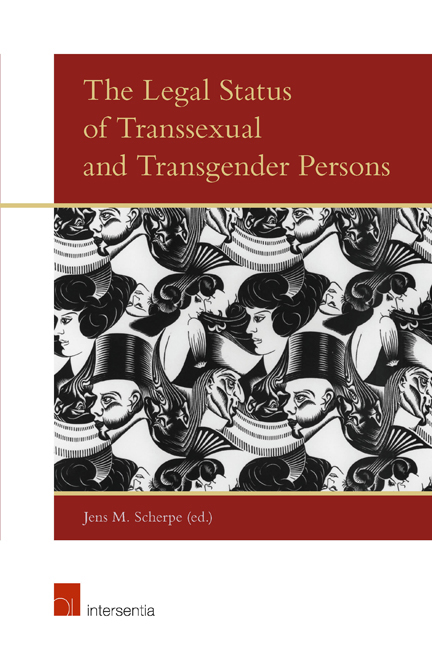Book contents
- Frontmatter
- Dedication
- Preface
- Contents
- List of Contributors
- Introduction
- PART I MEDICAL/PSYCHOLOGICAL VIEWS
- PART II CHRISTIAN VIEWS
- PART III LEGAL VIEWS
- Europe
- Belgium and the Netherlands
- Czech Republic
- Denmark
- England and Wales
- Germany
- Ireland
- Italy
- Spain
- Sweden
- Turkey
- Asia
- Australia and New Zealand
- North and South America
- PART IV CONCLUSION
Denmark
from Europe
Published online by Cambridge University Press: 28 November 2017
- Frontmatter
- Dedication
- Preface
- Contents
- List of Contributors
- Introduction
- PART I MEDICAL/PSYCHOLOGICAL VIEWS
- PART II CHRISTIAN VIEWS
- PART III LEGAL VIEWS
- Europe
- Belgium and the Netherlands
- Czech Republic
- Denmark
- England and Wales
- Germany
- Ireland
- Italy
- Spain
- Sweden
- Turkey
- Asia
- Australia and New Zealand
- North and South America
- PART IV CONCLUSION
Summary
LEGAL FRAMEWORK AND STATISTICS
SPECIFIC LEGAL RULES DEALING WITH TRANSSEXUAL OR TRANSGENDER PERSONS
The General Constitutional Framework of Denmark
Denmark is a small Scandinavian country with a population of approximately 5.6 million (2014). Denmark is characterised by a high standard of living, the highest taxes in the world, democracy, and universal welfare services, such as free health care and free education. The labour market is flexible, the Danish Model, and men and women work almost the same number of hours. Around 11% of the population are immigrants or their descendants. Denmark is a member of, inter alia, the European Union (EU), the United Nations (UN), the North Atlantic Treaty Organization (NATO), the Organization for Economic Co-operation and Development (OECD), the World Trade Organization (WTO) and the International Monetary Fund (IMF). Denmark is reported to have the lowest levels of corruption in the world, and Danish people are supposedly the happiest individuals.
The legal foundation in Denmark is the Constitution. Denmark is a constitutional monarchy, and the powers of state are divided between three institutions. The legislative power rests with the Parliament and the king (the government), the executive power belongs to the king (the government), and the judicial power is invested in the courts, who interpret and apply legislation and regulations.
Statutory laws – in the form of Acts – are passed by the Parliament. Parliament can, and does, delegate rulemaking competencies to administrative bodies (the Ministries) through Acts. The Ministries issue Administrative Orders, which cannot expand or derogate from the delegated mandate. Administrative orders are binding, whereas Administrative Guidelines, issued according to Administrative Orders, are binding for public authorities only, not private citizens. Lower level rules cannot derogate from or expand upper level rules – a distinct hierarchical system of regulation. Public authorities administrate the rights and obligations of citizens, and manage the everyday application of rules in real life. The authorities must apply their discretionary powers in accordance with the procedures and within the framework of the rules (Acts, Administrative Orders, Administrative Guidelines, and the recognised principles of public administration, such as the principle of equality). The rule of law is a fundamental principle in the Danish legal system.
- Type
- Chapter
- Information
- The Legal Status of Transsexual and Transgender Persons , pp. 147 - 182Publisher: IntersentiaPrint publication year: 2015



